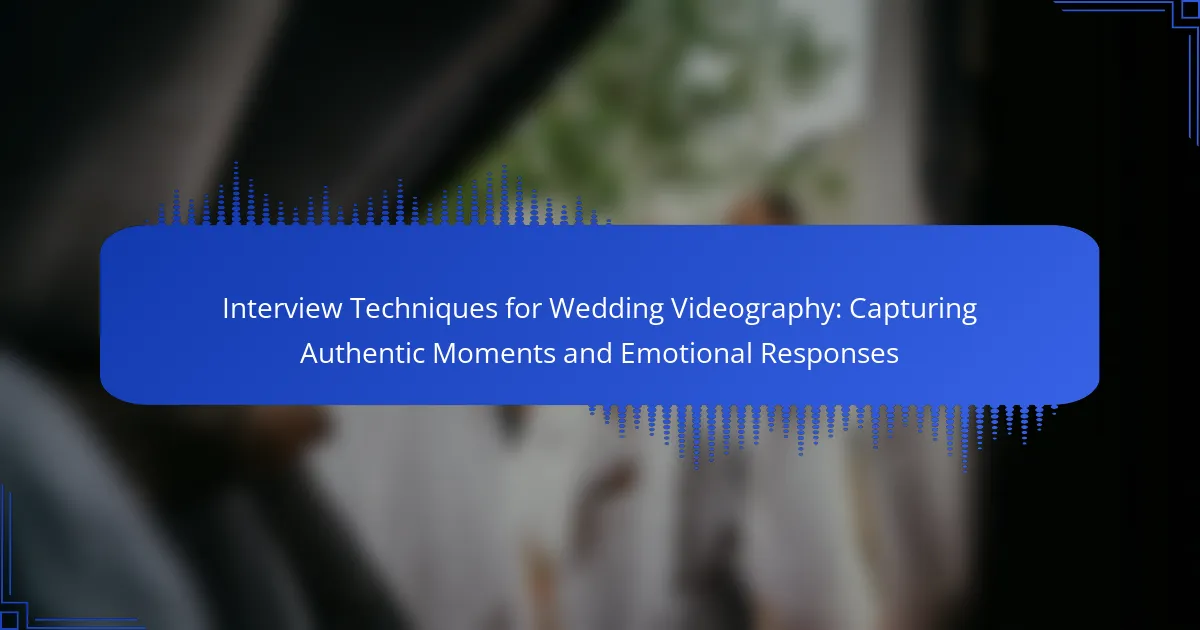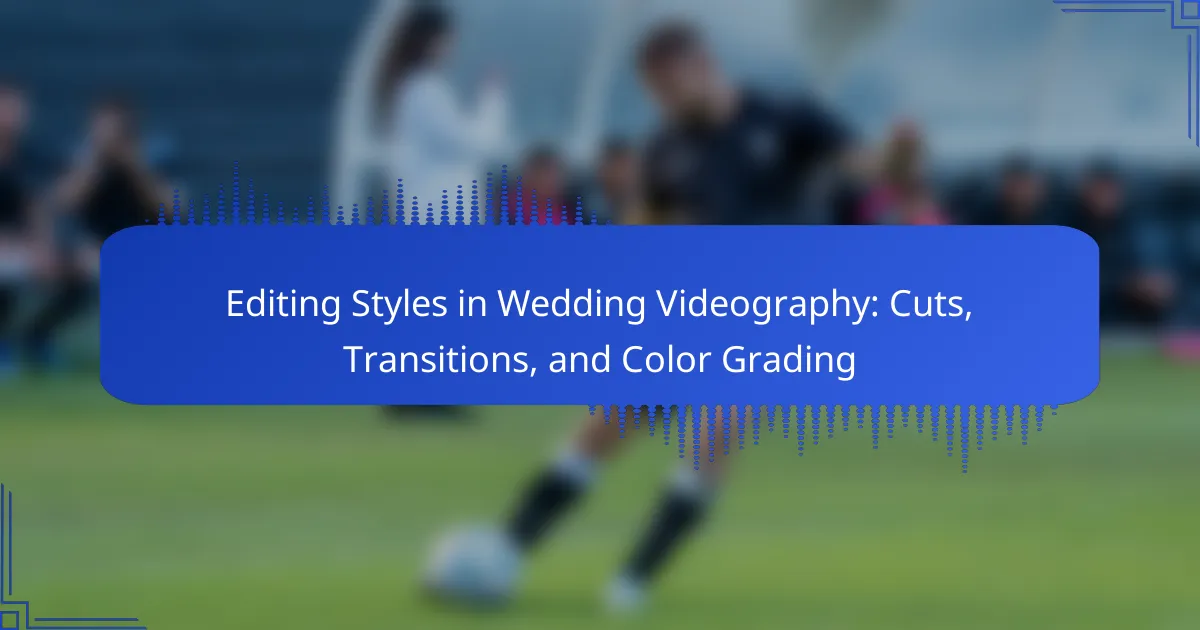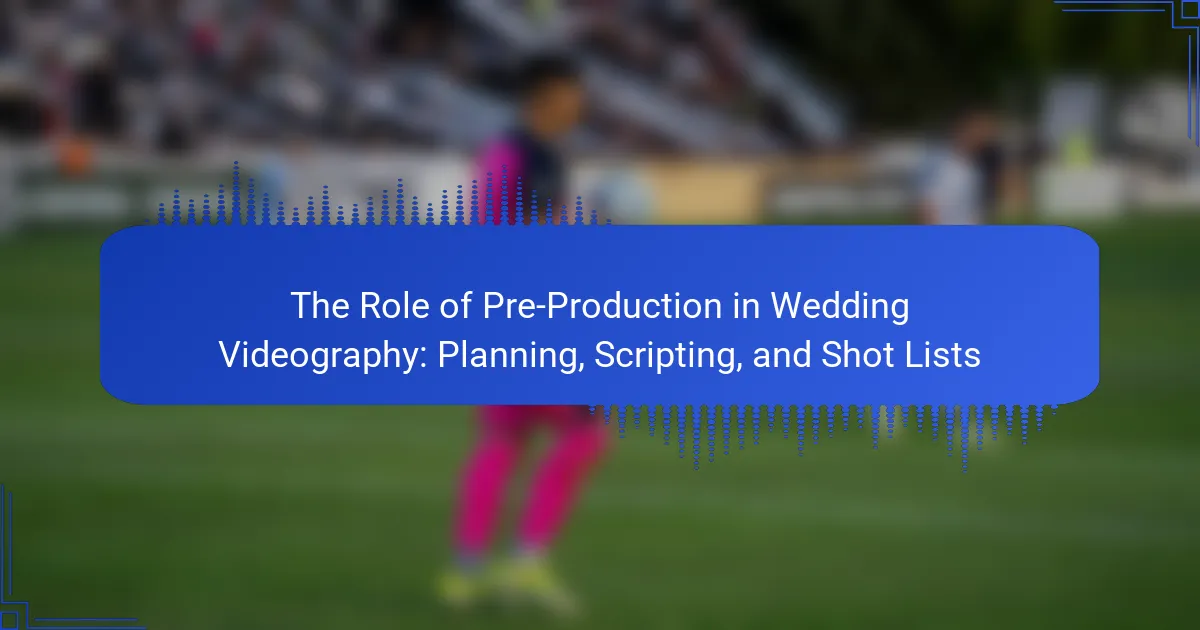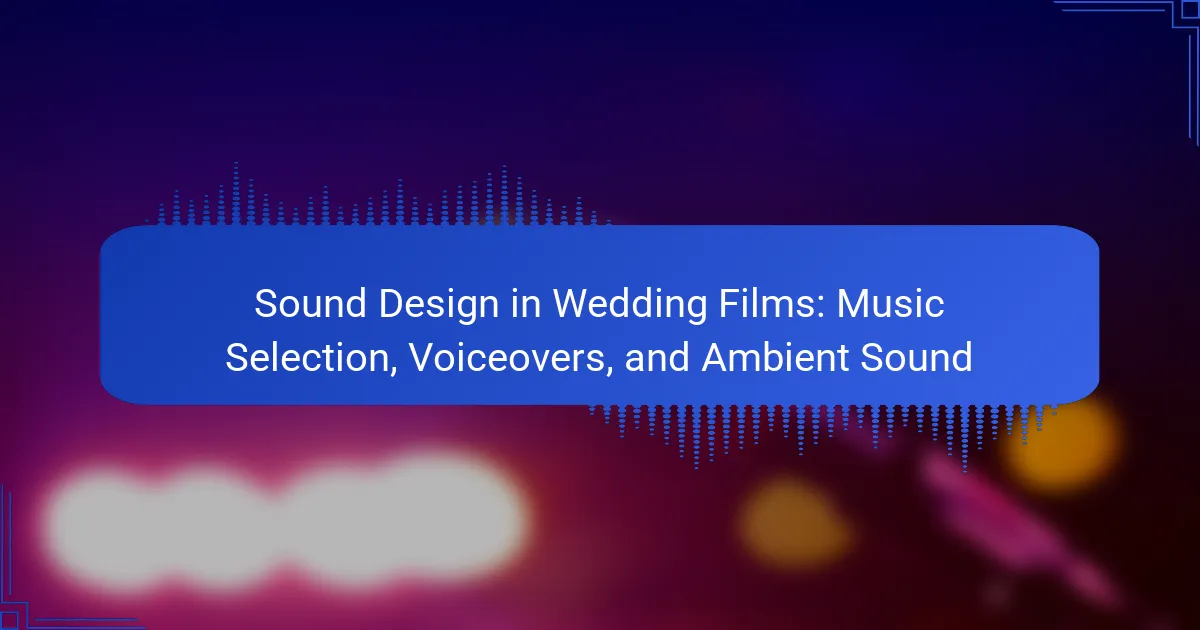The article focuses on interview techniques for wedding videography, emphasizing the importance of capturing authentic moments and emotional responses. Key techniques include preparing open-ended questions, creating a comfortable environment, and practicing active listening to foster genuine interactions with subjects. The article outlines best practices such as conducting pre-event consultations, familiarizing with the venue, and ensuring equipment functionality. It highlights the significance of good audio quality, respectful engagement, and the ability to adapt to unexpected situations to enhance storytelling in wedding videos. Overall, these strategies contribute to producing heartfelt and meaningful wedding videography.
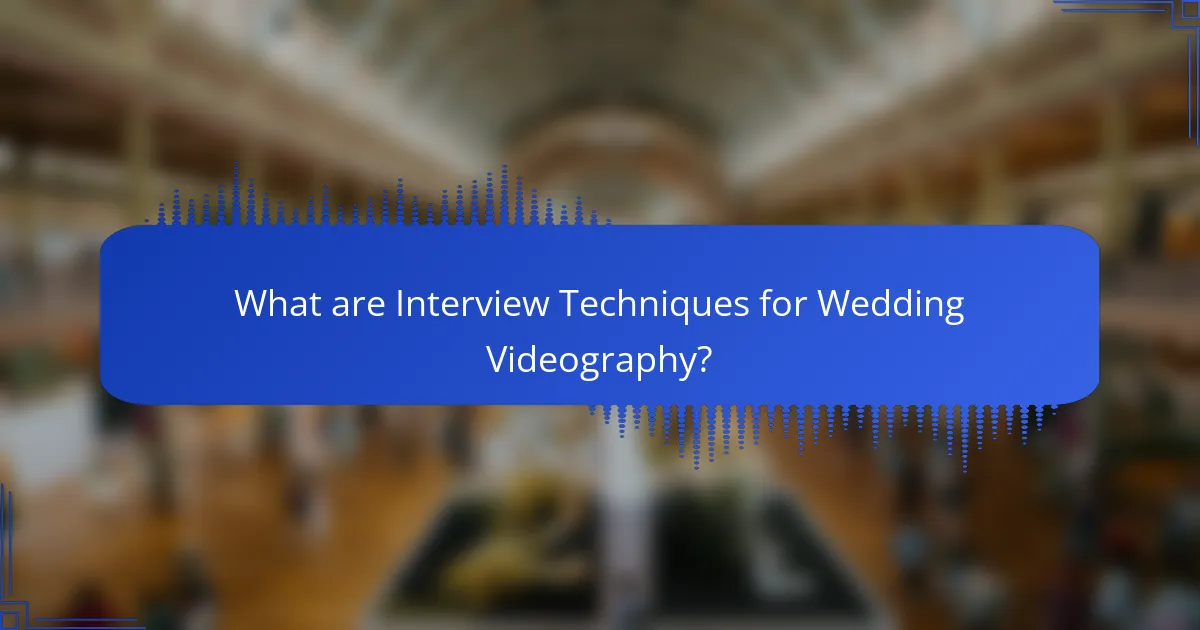
What are Interview Techniques for Wedding Videography?
Interview techniques for wedding videography include preparing questions, creating a comfortable environment, and actively listening. Preparing open-ended questions encourages detailed responses. A comfortable environment helps subjects feel at ease, leading to more authentic reactions. Active listening allows videographers to capture genuine emotions and follow up on interesting points. Using natural light and good framing enhances visual storytelling. Recording in a quiet location minimizes distractions. Engaging with subjects personally fosters trust and openness. These techniques collectively contribute to capturing heartfelt moments and emotional responses in wedding videography.
How do interview techniques enhance wedding videography?
Interview techniques enhance wedding videography by capturing genuine emotions and personal stories. These techniques involve asking open-ended questions that encourage couples and guests to share their thoughts. Such interactions create an intimate atmosphere, allowing authentic moments to unfold on camera. This approach results in more relatable and heartfelt footage. In turn, it enriches the final video with personal narratives that resonate with viewers. Research shows that emotional engagement significantly increases viewer satisfaction in wedding videos. Thus, effective interview techniques are vital for producing compelling wedding videography.
What role do interviews play in capturing authentic moments?
Interviews play a crucial role in capturing authentic moments during wedding videography. They provide a platform for individuals to express genuine emotions and thoughts. This candid expression often reveals deeper connections and personal stories. Interviews can capture spontaneous reactions that might not occur in a scripted setting. The unscripted nature of interviews allows for a more organic portrayal of relationships. This approach enhances the emotional depth of the final video. Research shows that authentic storytelling significantly resonates with audiences. Capturing these moments helps create a lasting memory that reflects true sentiments.
How can emotional responses be effectively recorded during interviews?
Emotional responses can be effectively recorded during interviews by utilizing both verbal and non-verbal cues. Interviewers should actively listen to the interviewee’s words and observe their body language. Recording devices, such as audio and video equipment, can capture these responses accurately. Additionally, asking open-ended questions encourages interviewees to express their feelings more freely. It’s important to create a comfortable environment to foster genuine emotional expression. Techniques such as reflective listening can help clarify and deepen the interviewee’s emotional responses. Research shows that non-verbal communication accounts for a significant portion of emotional expression, making its observation crucial. By combining these methods, interviewers can create a comprehensive record of emotional responses.
What types of interviews are common in wedding videography?
Common types of interviews in wedding videography include couple interviews, family interviews, and guest interviews. Couple interviews focus on the bride and groom’s thoughts and feelings about their relationship. Family interviews capture parents’ and siblings’ perspectives, adding emotional depth. Guest interviews provide insights from friends, sharing personal anecdotes. These interviews help create a comprehensive narrative of the wedding day. They enhance storytelling by showcasing various viewpoints and emotions. Using these interview types contributes to a rich and memorable wedding video.
What is the difference between pre-wedding and post-wedding interviews?
Pre-wedding interviews occur before the wedding day, while post-wedding interviews take place after the ceremony. Pre-wedding interviews typically focus on the couple’s relationship, their expectations, and their vision for the wedding. These interviews help capture emotions and insights leading up to the event. In contrast, post-wedding interviews reflect on the couple’s experiences during the wedding, their feelings about the day, and memorable moments. This difference in timing influences the content and emotional tone of the interviews, providing a comprehensive view of the couple’s journey.
How do on-the-spot interviews differ from planned interviews?
On-the-spot interviews occur spontaneously, while planned interviews are scheduled in advance. On-the-spot interviews often capture genuine, immediate reactions from subjects. This can lead to more authentic emotional responses. Planned interviews allow for preparation, resulting in more structured and thoughtful answers. The setting for on-the-spot interviews is usually informal. In contrast, planned interviews often take place in a controlled environment. The unpredictability of on-the-spot interviews can yield unique content. Meanwhile, planned interviews can focus on specific topics or themes.
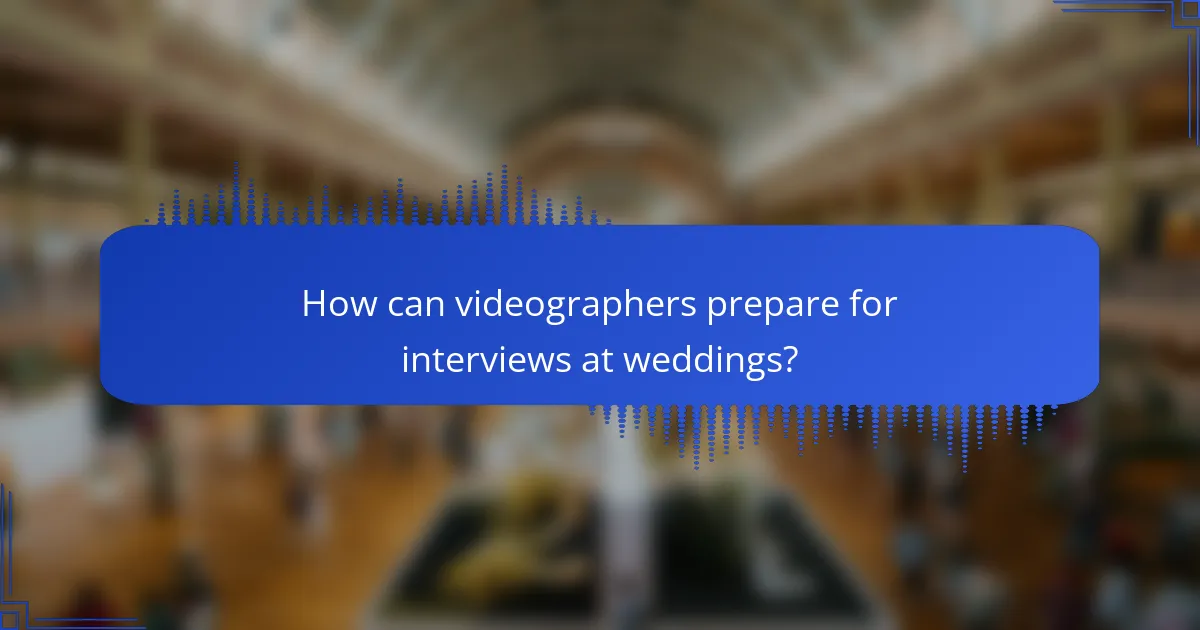
How can videographers prepare for interviews at weddings?
Videographers can prepare for interviews at weddings by conducting thorough pre-event consultations with the couple. This allows them to understand the couple’s story, preferences, and key moments they want captured. They should also create a list of potential interview questions tailored to the couple’s personalities and relationship. Familiarizing themselves with the venue is essential for planning optimal shooting angles and lighting conditions.
Additionally, testing their equipment before the event ensures it functions properly. Videographers should also practice active listening techniques to capture genuine responses during interviews. Having a backup plan for unexpected situations, such as equipment failure or weather changes, is crucial. Finally, building rapport with the couple can create a comfortable atmosphere, leading to more authentic interviews.
What key questions should videographers ask during interviews?
Videographers should ask open-ended questions to encourage detailed responses. Questions like, “What does this day mean to you?” can elicit emotional insights. Asking, “Can you share a favorite memory of the couple?” helps capture personal stories. Inquiring about expectations, such as “What do you hope to see in the final video?” clarifies client desires. Questions about family dynamics, like “How do your families influence your relationship?” provide context for the video. Additionally, asking, “What challenges have you faced together?” can reveal depth in the couple’s journey. These questions facilitate a deeper connection and enhance storytelling in wedding videography.
How can open-ended questions facilitate deeper responses?
Open-ended questions facilitate deeper responses by encouraging elaboration and reflection. These questions require more than a simple yes or no answer. They invite the respondent to share their thoughts and feelings in detail. This approach fosters a more engaging dialogue. It allows interviewees to express their personal experiences and emotions. Research indicates that open-ended questions can lead to richer narratives. For instance, a study by the University of Southern California found that such questions enhance storytelling. This results in more meaningful and authentic responses, especially in emotional contexts like weddings.
What specific topics should be covered to ensure authenticity?
To ensure authenticity in wedding videography interviews, specific topics must be covered. These include the couple’s personal stories, their relationship history, and significant moments that define their bond. Discussing their expectations for the wedding day adds context. Exploring their families’ backgrounds and traditions can reveal deeper emotional connections. Addressing the couple’s favorite memories together can enhance storytelling. Additionally, capturing their thoughts on love and commitment provides genuine insights. Finally, discussing any challenges they’ve overcome together adds depth to their narrative. These topics collectively foster an authentic portrayal of the couple’s journey.
What techniques can be used to create a comfortable interview environment?
To create a comfortable interview environment, establish rapport with the interviewee. Use open body language and maintain eye contact to show engagement. Choose a quiet, well-lit location to minimize distractions. Allow the interviewee to choose their seating arrangement for comfort. Begin with light conversation to ease tension before diving into deeper questions. Use active listening techniques to validate their responses. Provide reassurance and express appreciation for their participation. These techniques foster trust and openness, leading to more authentic responses.
How can body language influence the interview process?
Body language significantly influences the interview process by affecting perceptions and communication. Non-verbal cues such as posture, eye contact, and gestures convey confidence and engagement. Studies show that 55% of communication is non-verbal, highlighting its importance. Positive body language can create rapport and trust with the interviewee. Conversely, negative body language may signal disinterest or discomfort. For instance, crossed arms can be interpreted as defensiveness. Understanding these cues can enhance the quality of responses during interviews. Effective body language can lead to more authentic moments and emotional connections in wedding videography.
What strategies can help in building rapport with interviewees?
To build rapport with interviewees, active listening is essential. This involves giving full attention to the speaker and acknowledging their feelings. Use open-ended questions to encourage dialogue. This allows interviewees to express themselves freely. Maintain eye contact to show engagement and interest. A warm, friendly tone can create a comfortable atmosphere. Sharing personal experiences can help establish common ground. Finally, be respectful and patient, as this fosters trust. These strategies are supported by communication research indicating that rapport enhances interview quality and depth.
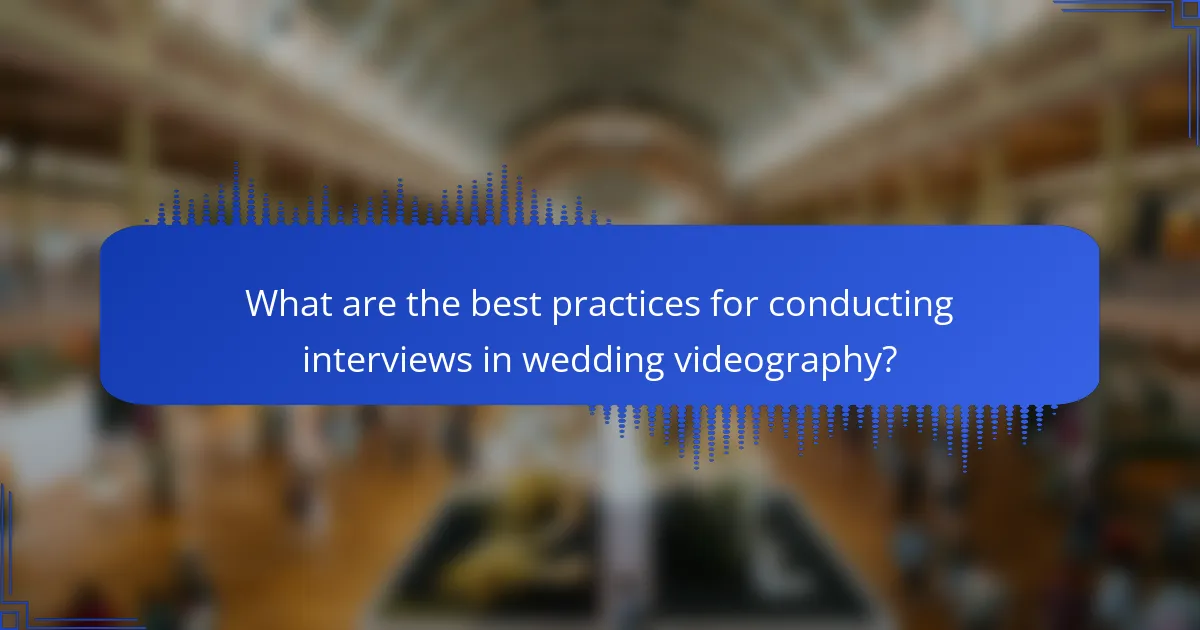
What are the best practices for conducting interviews in wedding videography?
The best practices for conducting interviews in wedding videography include preparing questions in advance. This ensures a structured conversation that flows naturally. Establishing a comfortable environment is crucial. A relaxed setting encourages genuine responses from interviewees. Using open-ended questions allows for deeper insights. This technique invites the interviewee to share their thoughts freely.
Active listening is essential during the interview process. It helps in building rapport and understanding emotions. Recording interviews with quality equipment ensures clarity. Good audio captures the essence of the moment effectively. Following up with clarifying questions can enhance the depth of responses. This approach leads to richer storytelling in the final video. Finally, being respectful and sensitive to emotions is vital. Weddings are emotional events, and empathy can create a more authentic experience.
How can videographers ensure high-quality audio and video during interviews?
Videographers can ensure high-quality audio and video during interviews by using professional equipment and proper techniques. They should utilize high-quality microphones to capture clear audio. Lavalier microphones are ideal for interviews as they minimize background noise. Videographers must also set up proper lighting to enhance video quality. Natural light or softbox lights can create a flattering appearance.
Additionally, maintaining a stable camera position is crucial. Using a tripod prevents shaky footage. Videographers should also monitor audio levels with headphones during recording. This ensures that any issues can be addressed immediately. Lastly, recording in a quiet environment reduces unwanted sound interference. Following these practices leads to high-quality audio and video, enhancing the overall interview experience.
What equipment is essential for capturing interviews effectively?
Essential equipment for capturing interviews effectively includes a high-quality microphone, a reliable camera, and good lighting. A high-quality microphone ensures clear audio, which is crucial for capturing dialogue accurately. Lavalier microphones are often preferred for interviews due to their discreet size and ability to capture sound close to the speaker’s mouth. A reliable camera is necessary to record high-definition video, which enhances the visual quality of the interview. Good lighting is essential to create a flattering and professional look, minimizing shadows and ensuring the subject is well-lit. Using softbox lights or LED panels can help achieve this effect. Additionally, a tripod stabilizes the camera, preventing shaky footage and ensuring a steady shot throughout the interview.
How can lighting be optimized for interview settings?
Lighting can be optimized for interview settings by ensuring adequate illumination on the subject’s face. Utilize soft, diffused light to minimize harsh shadows. Position lights at a 45-degree angle to the subject for a flattering effect. Use a key light as the primary source and fill light to reduce shadows. Natural light can also be effective; position the subject facing a window. Avoid overhead lighting, as it can create unflattering shadows. Adjust the color temperature to match the environment for a cohesive look. Consistent lighting helps maintain the emotional tone throughout the interview.
What tips can help videographers capture genuine emotional moments?
To capture genuine emotional moments, videographers should focus on building rapport with subjects. Establishing trust encourages authentic reactions. Using open-ended questions can elicit deeper responses. This technique fosters emotional engagement during interviews. Being present and attentive allows videographers to notice subtle expressions. Capturing candid moments requires patience and unobtrusiveness. Aiming for natural lighting enhances the emotional tone of the footage. Finally, editing techniques that highlight raw emotions can amplify the impact of the final piece.
How can videographers encourage interviewees to share personal stories?
Videographers can encourage interviewees to share personal stories by creating a comfortable environment. This includes establishing trust and rapport with the interviewee. Asking open-ended questions prompts deeper responses. For example, questions like “Can you tell me about a memorable moment?” invite storytelling. Active listening reinforces the interviewee’s confidence. Maintaining eye contact and nodding shows engagement. Additionally, sharing personal anecdotes can inspire interviewees to open up. Research indicates that a relaxed atmosphere significantly increases the likelihood of sharing personal stories.
What techniques can be used to capture spontaneous reactions?
Techniques to capture spontaneous reactions include using open-ended questions, creating a comfortable environment, and employing active listening. Open-ended questions encourage detailed responses, allowing subjects to express themselves freely. A comfortable environment reduces anxiety, making individuals more likely to react naturally. Active listening shows genuine interest, prompting more authentic and spontaneous responses. These techniques are supported by research indicating that emotional authenticity increases in relaxed settings.
What common challenges do videographers face during interviews?
Videographers commonly face challenges such as poor audio quality during interviews. Background noise can interfere with capturing clear sound. Additionally, lighting conditions may not be ideal, leading to poorly lit footage. Subjects may also experience nervousness, which affects their performance on camera. Unpredictable emotions can complicate capturing authentic responses. Technical issues, such as equipment malfunctions, can arise unexpectedly. Lastly, time constraints may limit the opportunity for thorough interviews. These challenges can hinder the overall quality of wedding videography.
How can videographers overcome nervousness in interviewees?
Videographers can overcome nervousness in interviewees by creating a comfortable environment. Establishing rapport is essential. This can be achieved through casual conversation before filming. Using humor can also help to ease tension. Additionally, providing clear instructions on what to expect during the interview is beneficial. Encouraging interviewees to express themselves freely fosters authenticity. Practicing active listening reassures them that their thoughts are valued. A relaxed demeanor from the videographer can significantly influence the interviewee’s comfort level. Research indicates that a supportive atmosphere enhances the quality of responses in interviews.
What solutions exist for technical difficulties during interviews?
Solutions for technical difficulties during interviews include having backup equipment and a reliable internet connection. Backup equipment ensures that if one device fails, another can be used immediately. A strong internet connection prevents disruptions during virtual interviews.
Testing all equipment before the interview is essential. This includes cameras, microphones, and lighting setups. Ensuring that all software is updated can prevent compatibility issues.
Using a dedicated interview space minimizes distractions and technical problems. Having a technical support person available can help resolve issues quickly. Clear communication with interview subjects about potential technical challenges can also prepare them.
These solutions are supported by industry best practices, which emphasize preparation and adaptability in videography.
What are some practical tips for improving interview techniques in wedding videography?
To improve interview techniques in wedding videography, focus on preparation, environment, and communication. Prepare a list of open-ended questions to encourage detailed responses. Choose a quiet location to minimize distractions and enhance audio quality. Use natural lighting to create a flattering visual atmosphere. Establish rapport with interviewees to make them feel comfortable. Maintain eye contact to foster connection and engagement. Actively listen and respond to answers to encourage deeper conversation. Finally, practice editing techniques to enhance storytelling in post-production. These strategies collectively ensure authentic moments and emotional responses are effectively captured.
Interview techniques for wedding videography focus on capturing authentic moments and emotional responses through effective communication strategies. Key techniques include preparing open-ended questions, fostering a comfortable environment, and actively listening to interviewees. The article explores the importance of interviews in enhancing storytelling, the types of interviews commonly conducted, and the best practices for ensuring high-quality audio and video. Additionally, it addresses challenges videographers face, such as nervousness in subjects and technical difficulties, while offering practical tips for improving interview techniques to create memorable wedding videos.
